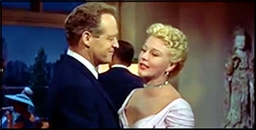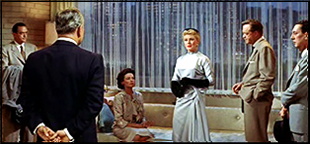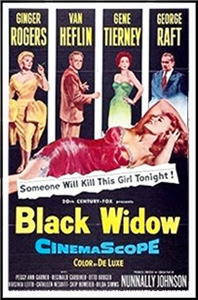Mon 18 May 2020

BLACK WIDOW. 20th Century Fox, 1954. Ginger Rogers, Van Heflin, Gene Tierney, George Raft, Peggy Ann Garner, Reginald Gardiner, Virginia Leith, Otto Kruger, Skip Homeier. Produced, written and directed by Nunnally Johnson. Based on the novel by Patrick Quentin.
Somewhere in this Technicolor wide-screen Cinescope production, there is a rather ordinary back-and-white but still effective noir film just aching to break out. When the wife (Gene Tierney) of successful New York City playwright Peter Denver (Van Heflin) goes out of town for an undetermined amount to time to be with her sick mother, he makes an all but fatal mistake. He allows a young would-be writer (Peggy Ann Garner) in ingratiate herself into his life.

She’s twenty years old and sweet-talkingly fresh from Savannah, Georgia, and while we the audience know how up to no good she is, Peter Denver is oblivious to the obvious. It does not help that the leading lady (Ginger Rogers) in his current play on Broadway lives with her husband the the apartment just above the Denvers. She is the epitome of catty and a woman who does not care who knows it. Discreet is not a word in her vocabulary.
And when upon Iris’s return young Nancy is found dead in the Denvers’ bathroom, Peter finds the hangman’s noose tightening around his own throat. Figuratively speaking, but still a distinct possibility, unless he does something about it personally, even while the police, in the person of homicide captain George Raft, are hot on his trail.

At which point the nor aspects are set aside and the story becomes that of a much more ordinary detective mystery. A very very solid one, I hasten to add, but a story not quite as interesting as the jam Peter Denver gets himself into, quite unwittingly. I’m sure that fans of film noir will find the first half as satisfying enjoyable as I did. All the performances are very good, but Van Heflin and Peggy Ann Garner outshine them all.
I do not know why Peter and Iris Duluth’s name was change to Denver for the sake of the movie, but I suspect (without evidence) that other less obvious changes from the book were made also. Those who have read the book can perhaps tell us more.

May 18th, 2020 at 10:37 pm
Denver and Duluth. Say them both aloud a few times, together, and the desirability of the change should become clear.
May 18th, 2020 at 11:27 pm
Why not Dayton?
Incidentally, Steve, you hit the nail out of the park. “Solid” and “Ordinary”sum it up. I’m just surprised they got such a cast of one-time stars to lend their faded luster to the marquee.
May 18th, 2020 at 11:36 pm
Barry’s right. On the screen, Denver fits. Duluth doesn’t. Dayton??? Well, it’s not Detroit.
July 15th, 2021 at 9:52 am
[…] The story was brought to the cinema under the same title in the 1954 film ​written, produced, and directed by Nunnally Johnson and starring Ginger Rogers, Van Heflin, Gene Tierney, and George Raft. The film version has been reviewed, among others, by John Grant at Noirish, and Martin Edwards at ‘Do You Write Under Your Own Name?’and Curtis Evans at The Passing Tramp.Steve at Mystery File. […]